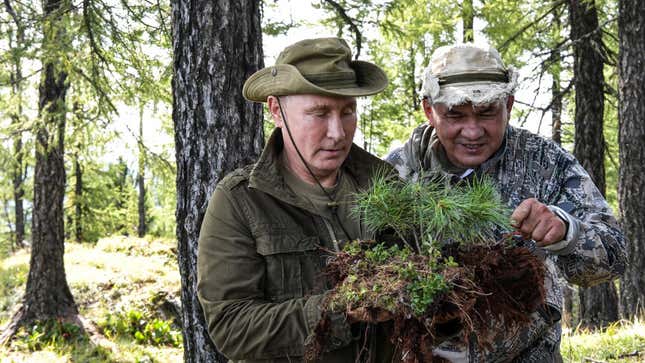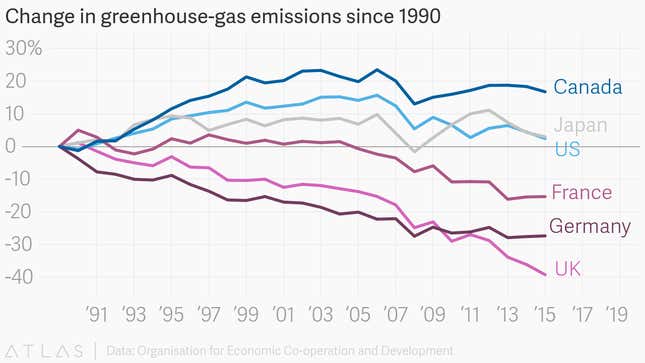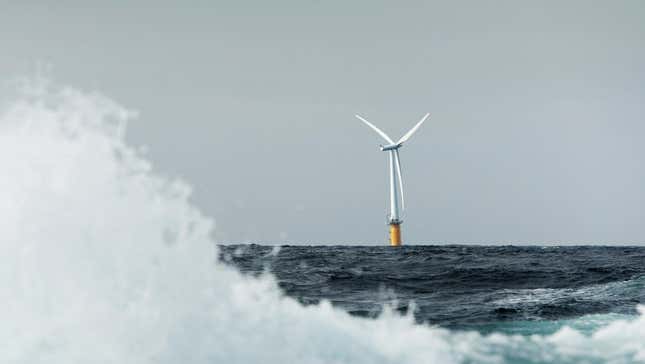In case you missed it, you can watch last week’s conference call on Vicki Hollub, carbon capture, and the future of oil.
Here’s what happened over the past week that helped or harmed the world’s chances to cut greenhouse-gas emissions to zero.

🔽 Decreases emissions
1️⃣ Though the Paris climate agreement has been signed by all countries in the world, 11 countries haven’t yet ratified it: Angola, Eritrea, Iran, Iraq, Kyrgyzstan, Lebanon, Libya, Russia, South Sudan, Turkey, and Yemen. Russia is the largest emitter in the list, and it said this week that it will ratify the agreement in September.
2️⃣ Mining giant BHP will likely join others like Rio Tinto and Anglo American in divesting from thermal coal (used in power plants). The news comes as Moody’s predicts that coal will make up only 11% of electricity generation in the US in 2030, down from 27% in 2018.
3️⃣ Onshore wind power alone can generate 10 times as much electricity as Europe consumes today. Though no one is looking to build so much wind power capacity, it goes to show how much more scope there is to deploy renewables. This week also saw Swedish wind developer Vattenfall win a subsidy-free deal to build 760 MW of offshore wind power in Dutch waters.
4️⃣ Scientists at the King Abdullah University of Science and Technology in Saudi Arabia have developed a device that can both generate electricity and desalinate water using sunlight. In Arab countries, as much as 15% of all electricity is used to desalinate water. Related, BP Lightsource is looking to develop shinier grass in the UK to deploy bifacial solar panels.
5️⃣ Air travel news round up: France will levy a modest tax on outbound flights, raising €180 million ($200 million) each year. KLM airlines is encouraging its customers not to fly. The idea of flygskam, which means “flight shame” in Swedish, is spreading fast across Europe.
The climate policy wonk

When it comes to cutting emissions, the UK leads the pack among rich countries. Last month, the country set a legally binding target to reach net-zero emissions by 2050. To keep the government on track, the UK has an independent body of technical minds in the Committee on Climate Change that will both scrutinize progress and advise how to meet climate goals. It’s a model of climate governance that other countries should copy.
0️⃣ Net-zero (for now)
1️⃣ Climate activists are finding a warmer reception at shareholder meetings. Via Reuters: “Of the 145 climate-related proposals filed for this year’s annual meeting season, 39% led to deals, up from 21% in 2015.”
2️⃣ After fleeing wildfires in California, investor Trevor Neilson launched the Climate Emergency Fund. Its first investment: £500,000 ($630,000) will go to support Extinction Rebellion, school strikes, and similar grassroots activism.
3️⃣ Via Mother Jones: “Increasingly, [researchers] have begun publicly discussing the psychological impact of contending with data pointing to a looming catastrophe, dealing with denialism and attacks on science, and observing government inaction in the face of climate change.”
4️⃣ Flooding in the US is exposing infrastructure that can’t handle climate change and forcing the government to buy homes that keep flooding again and again.
5️⃣ The policy that can do the most to fight climate change is the most neglected: spending money on research and development of clean energy.
Share this please
Among all the individual actions that can help fight climate change, the most effective one is to talk about the crisis with people who don’t think or don’t realize it’s a problem. I’m pretty sure you know someone who falls in that category. Please forward them this email or share this link.

🔼 Increases emissions
1️⃣ Global spending on clean energy in the first half of 2019 is down 14% compared with last year. The countries that saw a decline: China, the US, Germany, France, and the Netherlands. The countries that saw a rise: Japan, India, Brazil, Spain, the UK, Sweden, and Ukraine.
2️⃣ Methane leaks from Californian homes may be 10 times higher than previous estimates. Even more reason to adopt non-fossil heating appliances.
3️⃣ As we saw in last week’s edition, the idea of planting trees to offset emissions is gaining momentum. It sounds simple enough, but, as this story in Ireland shows, it never is. Residents are complaining that the government’s afforestation program is planting the wrong sort of trees. Meet the spruce haters!
4️⃣ The world’s 10 most climate vulnerable countries are also going to see a population boom in the coming decades.
Stats to remember
As of July 1, the concentration of carbon dioxide in the atmosphere was 413.76 ppm. Indoor carbon dioxide levels—at as little as 1,000 ppm that can easily build up in bedrooms, classrooms, and offices—can have harmful effects on the human body such as poor cognitive performance.
Have a great week ahead. Please send tips to akshat@qz.com.